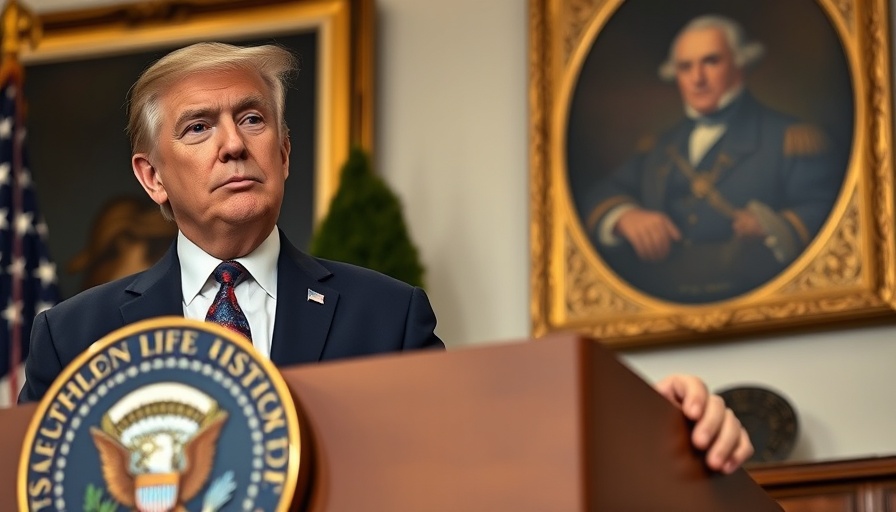
The Federal Funding Cuts: A Dangerous Precedent in Mental Health and Addiction Care
In a sweeping move that has sent shockwaves through the healthcare community, the Trump administration has announced the revocation of approximately $11.4 billion in federal funding earmarked for addiction and mental health care programs. This decision to freeze COVID-era grants not only threatens the stability of ongoing treatment initiatives but risks reversing hard-won progress in combating the nation's drug overdose crisis.
Understanding the Impacts on Addiction Services
Keith Humphreys, an addiction policy researcher at Stanford University, highlighted the operational chaos that this funding cut could unleash. Many public health departments and non-profits, heavily reliant on these federal funds, will likely face abrupt disruptions—forcing clinics to shutter their doors and leave patients without essential support. "This is chopping things off in the middle while people are actually doing the work," he noted, reflecting the dismay echoed across the field.
The Shifting Landscape of Mental Health and Addiction Treatment
The revocation of these funds comes at a pivotal time; while there has been a significant decline in drug overdoses linked to fentanyl and other dangerous substances due to prior funding increases under the Biden administration, the threat remains. More than 84,000 deaths related to substance use are recorded annually in the U.S., underscoring the dire need for continued, robust support in addiction care. The Trump administration's focus now leans toward addressing what it calls the "chronic disease epidemic," yet experts question if this diversion genuinely addresses the urgent needs of addiction treatment.
Merging Agencies: A Restructuring of Priorities?
The merging of the Substance Abuse and Mental Health Services Administration (SAMHSA) into a newly formed Administration for a Healthy America is another aspect of the restructuring strategy anticipated to eliminate thousands of federal jobs, including crucial researchers in addiction studies. This not only diminishes the federal workforce dedicated to addiction prevention and treatment but also signals a troubling shift in prioritizing direct public health interventions.
Expert Opinions: A Divide on Policy Implications
The decision to rescind vital funding has sparked fierce criticism from various experts within the fields of drug policy and public health. Regina LaBelle, a former official in the Biden administration, defensively queried on social media, "With overdose deaths still exceeding 80,000 annually, is this administration claiming victory over an epidemic it has yet to conquer?" Such remarks underline a significant tension surrounding federal strategy in addressing drug-related mortality.
The Broader Political Narrative
This funding cut arguably connects back to broader political narratives, as President Trump seeks to reshape health policy under the banner of a renewed national health agenda. Yet, the implications of such drastic measures raise flags about the long-term effectiveness of dealing with addiction and mental health crises. As public health experts continue to advocate for increased funding and resources tailored specifically to addiction treatment, the forthcoming months will be critical in evaluating the potential repercussions of this federal withdrawal.
What This Means for Businesses in Health and Tech
For CEOs and marketing leaders in health and tech sectors, the rescinding of this funding signifies the onset of deeper challenges within the addiction care paradigm. As the landscape tilts towards limited federal support, professionals may need to innovate treatment modalities and intensify outreach strategies to sustain their operational viability. The necessity to adapt to rapid policy shifts underscores the need for agile business models focused on patient-centered solutions.
Moving Forward: Actionable Steps
As stakeholders across the healthcare spectrum grapple with these developments, a roadmap emerges for businesses and organizations. Engaging in advocacy for mental health resources, formulating partnerships with non-profits, and exploring alternate funding avenues through grants can bolster the capacity of addiction care services. Building an informed dialogue with community leaders, legislators, and public health officials can significantly influence the future of treatment and recovery resources.
In light of this pressing issue, it is crucial for those in positions of influence to advocate for policies that prioritize and preserve funding for mental health and addiction services. The fight against substance abuse and mental health disorders cannot afford additional setbacks, and now is the time for strategic action and informed engagement.
 Add Row
Add Row  Add
Add 




 Add Row
Add Row  Add
Add 

Write A Comment